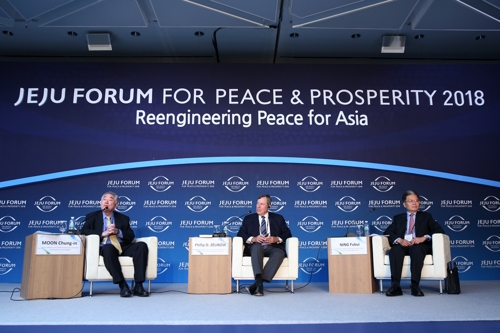News & Event
- Home
- News
- News & Event

According to Yonhap News,
(JEJU=Yonhap News) This week's international forum here on Korea peace has highlighted the need to coordinate subtly different positions among key players.
Participants in the annual Jeju Forum, mostly government officials and pundits, agreed that regional security conditions are at a historic moment. But they presented some divergent views on how to move the new process forward based on summit-level diplomacy with North Korea.
A senior Chinese official told a session that the U.N. Security Council will decide whether to ease sanctions on Pyongyang at an appropriate time if there's "progress" in denuclearization.
The comments by Ning Fukui, deputy special representative for Korean affairs at China's foreign ministry, represent a contrast to Washington's repeated statement that sanctions relief can be an option only after Pyongyang's "complete" denuclearization.
Speaking at a Senate panel in Washington, D.C., in fact, U.S. Secretary of State Mike Pompeo expressed concerns about China's recent move. He cited a "modest amount" of backsliding from its sanctions enforcement against the neighbor.
Ning was also critical of a denuclearization-focused approach toward the North. He called for "balance between the two wheels" -- achieving a nuclear-free Korea and establishing a peace regime.
"What matters more than speed or pace is balance," he stressed.
China shouldn't be marginalized, he added, as it's committed to playing a major role in the peace-building program via either four-way discussions or the resumption of six-party talks that came to a halt a decade ago.
Asked about whether China wants to join the envisioned declaration of a formal end to the 1950-53 Korean War, the former Chinese ambassador to South Korea was guarded.
"It's such a big question for me. I am not in a position to answer that for now," he said.
Many believe China's participation in bargaining with North Korea is double-sided. It could help persuade the communist ally or complicate negotiations.
U.S. officials are still wary of North Korean leader Kim Jong-un's intentions.
Nobody knows what's in his heart except himself, Marc Knapper, the acting U.S. ambassador to South Korea, pointed out.
The question is whether his dialogue is based on a "tactical, short-term" desire to ease sanctions on his country and increase his domestic legitimacy or he has made a "fundamental and strategic" decision to turn away from provocation, isolation and confrontation, Knapper told a separate session of the three-day forum.
Kim agreed to seek "complete" denuclearization and lasting peace in Korea during his back-to-back summits with the South's President Moon Jae-in at the border village of Panmunjom on April 27 and with U.S. President Donald Trump in Singapore on June 12.
"Over the next weeks and months we're gonna test the North's commitment to see if they truly are prepared to take the steps enshrined in these two very important documents from Singapore and from Panmunjom," said Knapper, who serves as charge d'affaires at the U.S. Embassy in Seoul.
On the suspension of the allies' combined exercises, the envoy said it's not an "irreversible" measure. It's just aimed at facilitating the denuclearization process and giving the North a chance, he said.
Japanese Ambassador to South Korea Yasumasa Nagamine recalled U.N. Security Council resolutions stipulating the "complete, verifiable, irreversible dismantlement (CVID)" of the North's nuclear program.
"This implementation has to be done," he said in English. "I'd like to draw your attention to President Trump's remarks that the sanctions should be relieved only when it's confirmed that North Korea's nuclear weapons are not a problem anymore."
He urged Pyongyang to address all the issues of abduction, its nuclear program and ballistic missiles.
"Regarding a bilateral summit between Japan and North Korea, it's essential for such a summit to take place, but it has to contribute to the comprehensive solution to the issues," he said. "Japan has communicated with North Korea through various channels, but nothing has been decided on this possible summit."
Knapper asked Japan and critics of the Singapore accord to wait and see the North's actions, rather than the semantics of the document.
Moon Chung-in, special adviser to South Korea's president for unification and national security affairs, also said the North's leader apparently understands his complete denuclearization commitment in the context of the CVID.
He added the leaders of the two Koreas had "in-depth" discussions on the matter when they met twice in the spring.
Regarding the North's pursuit of "security assurances," Moon, who had a number of meetings with North Korean officials, said it apparently means the acknowledgment of the nation's dynastic leadership system and socialist economy.
He also questioned if China should be involved in the potential war-ending declaration, which Seoul wants to do by the end of this year.
But Philip D. Zelikow, former counselor of the U.S. State Department, said he's against signing two separate documents: one for the declaration of an end to the war and the other for a peace treaty.
"If you say at the moment that you will declare the end of the war, the legal status of the Armistice Agreement is open to question," he said.
In dealing with the North Korea issue, "South Korea should be at the center," he said.
He proposed a "two-plus-two" model, in which the two Koreas lead the process, with the U.S. and China playing a supporting or endorsing role.
What's important is to put all related issues on the table, instead of narrowing the agenda on the denuclearization as the Bush administration did a decade ago, according to Zelikow, who currently teaches at the University of Virginia.
lcd@yna.co.kr
Copyrights Yonhap News. All Rights Reserved.
Reprint or redistribution without permission is prohibited.
Source: Yonhap News (June 28, 2018)